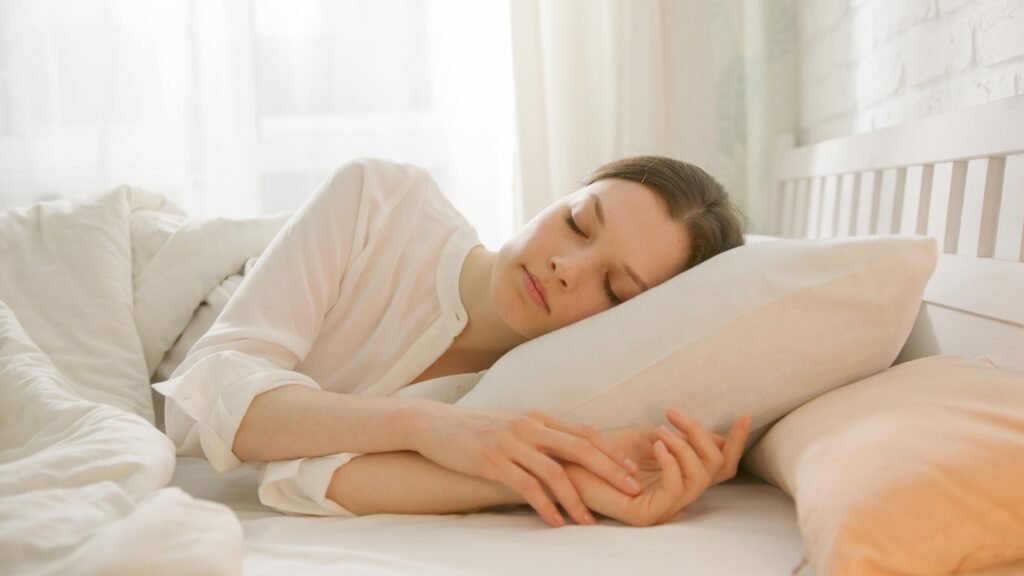
Overview
Quality sleep is essential for maintaining both physical and mental well-being. However, many people struggle with falling asleep or staying asleep through the night. What you eat before bed can have a significant impact on your sleep quality. Certain foods contain sleep-promoting nutrients that can help you fall asleep faster and enjoy deeper, more restful sleep. In this article, we’ll explore foods that can help you sleep better and how to incorporate them into your diet.
The Role of Diet in Sleep
Your diet affects almost every aspect of your health, including your sleep patterns. Several nutrients play key roles in regulating sleep:
- Melatonin: A hormone that regulates the sleep-wake cycle.
- Tryptophan: An amino acid that the body uses to produce serotonin and melatonin.
- Magnesium: A mineral that promotes relaxation by regulating neurotransmitters.
- Calcium: Helps the brain use tryptophan to produce melatonin.
- Vitamin B6: Supports serotonin production, which in turn enhances melatonin levels.
Eating foods rich in these nutrients can naturally boost your body’s ability to fall asleep and stay asleep.
7 Best Foods That Help You Sleep
1. Almonds
Almonds are an excellent source of magnesium, a mineral that helps improve sleep by reducing inflammation and lowering levels of the stress hormone cortisol, which can disrupt sleep. A handful of almonds before bed provides about 19% of your daily magnesium needs and may help promote a more restful night.
2. Turkey
Turkey is rich in tryptophan, an amino acid that increases the production of melatonin and serotonin, hormones that regulate sleep. This is why many people feel sleepy after a big Thanksgiving meal. Including turkey in your evening meal can make it easier to drift off to sleep.
3. Chamomile Tea
Chamomile tea is well-known for its calming properties and has been used for centuries as a natural remedy for insomnia. It contains an antioxidant called apigenin, which binds to receptors in the brain that help promote relaxation and sleep. Drinking a warm cup of chamomile tea before bed can help you unwind and prepare for sleep.
4. Kiwi
Kiwis are not only rich in vitamins C and E but also contain serotonin and antioxidants that promote better sleep. Studies have shown that consuming two kiwis an hour before bedtime can significantly improve sleep quality and duration, making them a great late-night snack.
5. Fatty Fish
Fatty fish like salmon, tuna, and mackerel are high in omega-3 fatty acids and vitamin D, both of which help regulate serotonin levels in the body. Serotonin is a neurotransmitter that helps regulate sleep and mood. Eating fatty fish a few times a week may help you fall asleep faster and stay asleep longer.
6. Walnuts
Walnuts are another great food for better sleep because they contain a natural source of melatonin. Consuming a handful of walnuts before bed can increase your blood levels of melatonin, helping you fall asleep more easily
Related: The Sleep Benefits of Tart Cherry Juice
7. Tart Cherry Juice
Tart cherries are one of the few natural sources of melatonin, and studies suggest that drinking tart cherry juice can help improve both sleep quality and duration. Consuming a small glass of tart cherry juice about 30 minutes before bed may help you sleep more soundly through the night.
Foods to Avoid Before Bed
Just as certain foods can help promote sleep, others can have the opposite effect and disrupt your sleep. Here are a few foods to avoid before going to bed:
- Caffeine: Found in coffee, tea, chocolate, and some sodas, caffeine is a stimulant that can keep you awake if consumed too close to bedtime.
- Spicy Foods: Spicy foods can cause heartburn or indigestion, making it harder to fall asleep comfortably.
- High-Fat Meals: Meals that are high in fat take longer to digest and can cause discomfort during sleep.
- Alcohol: While alcohol may make you feel drowsy initially, it can disrupt your sleep cycle and prevent deep, restorative sleep.
How to Incorporate Sleep-Promoting Foods into Your Routine
To improve your sleep, try incorporating some of these foods into your daily diet. Here are a few tips:
- Evening Snack: A small serving of almonds or a bowl of kiwi makes for a perfect bedtime snack.
- Dinner: Add turkey or fatty fish to your dinner for a protein-packed meal that helps promote sleep.
- Before Bed: Enjoy a cup of chamomile tea or a glass of tart cherry juice about an hour before bed to help you relax.
By adding these foods to your diet, you can improve your sleep quality and wake up feeling more refreshed and energized.
Tips for Better Sleep
While diet plays a crucial role in sleep, there are several other habits you can adopt to improve your sleep quality:
- Stick to a Regular Sleep Schedule: Going to bed and waking up at the same time every day helps regulate your internal clock, making it easier to fall asleep and wake up naturally.
- Create a Relaxing Bedtime Routine: Engage in calming activities before bed, such as reading, taking a warm bath, or meditating, to signal to your body that it’s time to sleep.
- Limit Blue Light Exposure: The blue light emitted from electronic devices like phones and computers can interfere with melatonin production, making it harder to fall asleep. Try limiting screen time an hour before bed.
The Takeaway
The foods you eat can have a powerful impact on your ability to fall asleep and stay asleep. By incorporating nutrient-rich foods like almonds, turkey, chamomile tea, and fatty fish into your diet, you can support your body’s natural sleep cycle and enjoy a more restful night. Pair these dietary changes with good sleep hygiene practices, and you’ll be well on your way to better, more restorative sleep
Frequently Asked Questions
What foods are best for improving sleep quality?
Foods rich in sleep-promoting nutrients like melatonin, tryptophan, magnesium, and calcium are best for improving sleep quality. Some top choices include almonds, turkey, chamomile tea, kiwis, and fatty fish.
How long before bed should I eat sleep-friendly foods?
It’s ideal to consume sleep-friendly foods about 1-2 hours before bedtime. This allows your body enough time to digest the food and absorb the nutrients that promote better sleep.
Can drinking chamomile tea really help me sleep?
Yes, chamomile tea is well-known for its calming properties. It contains apigenin, an antioxidant that binds to receptors in your brain, helping you relax and fall asleep more easily.
What foods should I avoid before bed to sleep better?
To improve sleep, avoid caffeine, spicy foods, high-fat meals, and alcohol before bed. These can disrupt your sleep cycle, cause discomfort, or make it harder to fall asleep.











